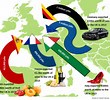The Guardian quotes an NIESR study that suggests food and other imported EU prices will rise if we go to World Trade Organisation rules with no EU trade deal, implying that we levy the same tariffs on the EU as the EU currently does to the rest of the world (‘MFN’ “most favoured nation” tariffs levied on all those with whom one does not have a free trade agreement).
This study is quite disingenuous as it assumes we levy these tariffs on the EU and do no Free Trade Agreements (FTAs) with the rest of the world even though it is central to government policy to do this. While the UK has said it will adopt these EU most favoured nation tariffs in the first instance, an important point, also made clear in government policy, is that these are maximum tariffs and could in many cases (e.g. where there is no significant UK production) be reduced or eliminated unilaterally.
Turning to the likely economic effects on UK prices of different assumptions, I would say that the NIESR’s study is flawed in various ways.
First, assuming we go to World Trade Organisation terms at existing EU tariffs and other practices, then Rest of the World producers will come in at the same prices as before; EU producers will face the UK tariff but then have to decide whether or how much to raise prices. To keep their market they would not raise at all, so no effect on prices. If they raise by the full tariff they may lose a lot of their market, in which case the prices go up but their importance in the consumer budget shrinks.
Second and more relevant, as we have seen above that it is central to government policy for the UK to sign Free Trade Agreements with our key world suppliers such as the US, Australia, New Zealand, Japan, South Korea and China.
These FTAs will bring prices down for products from the Rest of the World (ROW), and force EU producers to cut their prices in line to keep market share. In this case prices fall across the board, as in the projections made by Economists for Free Trade- see From Project Fear to Project Prosperity on www.economistsforfreetrade.com. Our estimate is that the UK Consumer Prices Index (CPI) falls 8% while the food only CPI falls 20% immediately on the opening of our food import market to the rest of the world.
In the specific cases of dairy and other food products, since they are for the most part essentially commodities, any producer must match the competition. So in the first case above where there are no FTAs, EU producers simply cannot raise prices and in the second case of widespread FTAs they must match the lower world prices charged by ROW producers.
Unfortunately all these points (which are not ‘facts’ so much as basic economic analysis) on trade are not much if at all understood by ‘informed opinion’ because for 40 years trade policy has been an EU matter. But research bodies like the NIESR and upmarket papers like the Guardian have a civic duty not to spread fake news and poor misleading analysis like this.
It is in any case extraordinary to suddenly claim after 50 years of European Union membership that “the poor will suffer” when entry into the then EEC led to much higher food prices, exacerbated by (EU induced) decimalisation rounding prices upwards and the (EU induced) regressive VAT – which have all been a burden on the average family since 1973.
Patrick Minford is Professor of Applied Economics at Cardiff University Business School, a position he has held since 1997. He was previously Edward Gonner Professor of Applied Economics at the University of Liverpool from 1976 to 1997.


















